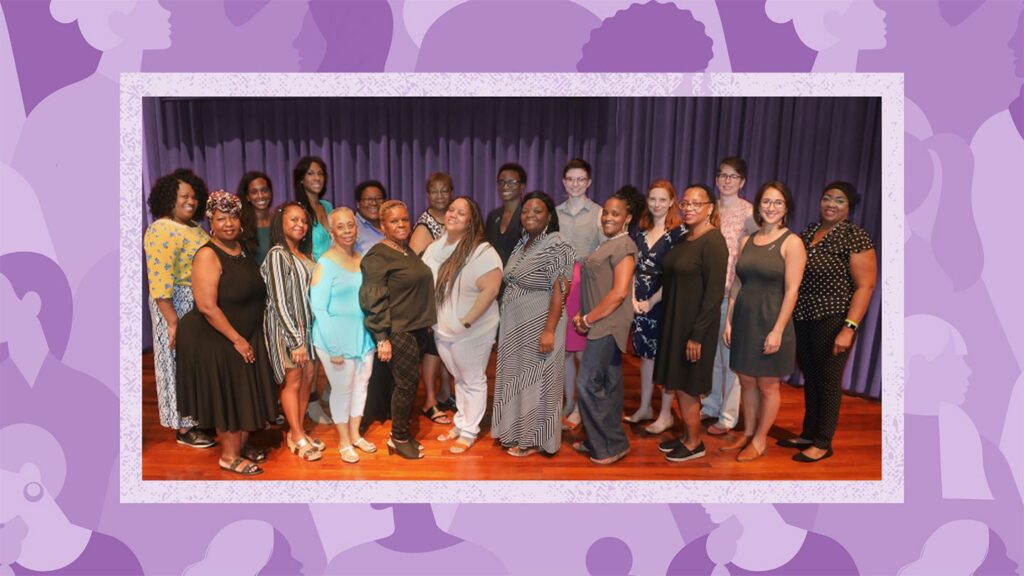Services ECANA Provides
ECANA provides in-person and virtual educational sessions and community support for women diagnosed with endometrial cancer and those at risk. Its programs include the following:
Survivors Sanctuary
Twice a month, ECANA hosts Survivors Sanctuary, an online program combining chair yoga with conversations where women can connect and share their experiences in a safe, empathetic environment. This time is unscripted, and women who are shy about sharing often feel empowered to speak up after getting to know the other women, Moore says.
At least once a month, the program includes a Purpose Living Bible Study session, where women can find strength, hope, and healing through shared faith. “We understand that for Black women faith is really foundational,” Moore explains.
If you’d like to participate, you can register through its website.
Project IMPACT
Project IMPACT is ECANA’s grassroots outreach initiative, designed to make endometrial cancer education accessible. The program was born from the lived experiences of Black women whose symptoms were often unaddressed or misdiagnosed.
“When those symptoms are missed and not addressed in a timely manner, we’re diagnosed at advanced stages of endometrial cancer,” Moore says. “We have to have the most aggressive types of treatment, and sometimes we lose our lives,” she adds.
Moore says Project IMPACT addresses this problem by training survivors and community supporters to meet people where they are and talk openly about the condition.
The program helps women understand the symptoms and risk factors of endometrial cancer. It also empowers women to recognize when their symptoms might be more serious, advocate for themselves, and communicate their concerns clearly with their healthcare providers. Teaching early symptoms and risk factors can save lives, especially when using culturally relevant materials, says Moore.
Clinical Trial Involvement
ECANA also encourages Black women to get involved in clinical trials. “[Doll] wanted to study why Black women were dying of endometrial cancer more than any other race,” Moore says. This led Doll to publish studies about endometrial cancer disparities and the underrepresentation of Black women in cancer research.
To make research better integrate the direct experiences of Black women, ECANA has built a team of survivors who partner with academic researchers. The organization shares clinical trial information on its website so women don’t have to search through databases on their own. When new trials become available, ECANA invites researchers into its community spaces to explain the goals, criteria, and details, says Moore. Sometimes, treatment costs can be partially covered if they are part of a trial, she says.
Those interested can contact ECANA to ask about specific research opportunities.
Education
Education is key, and ECANA has several resources, as well as a quarterly newsletter, to help you learn more about endometrial cancer. “You may pick up a brochure, but if it doesn’t look like you, you may think it doesn’t pertain to you,” Moore says. You can find these educational tools, along with personal patient stories, on its website.
“We want to make sure everyone knows all the resources available to them,” Moore says. “And that they’re not left out just because they don’t live in the right ZIP code.”
Events
Strides 2 Survive is ECANA’s annual 5K virtual walk-run honoring strength, solidarity, and awareness. Each September, which is Gynecologic Cancer Awareness Month, participants complete 3.1 miles however they choose: walking, running, or moving at their own pace, wherever they feel most comfortable. The event welcomes survivors, caregivers, supporters, and anyone who wants to help the cause.
In addition to the 5K, ECANA occasionally hosts special events through its Survivors Sanctuary program. Details are shared with the community throughout the year.
If you’d like to stay up to date with all of ECANA’s upcoming events, you can follow the organization on Instagram @ecanawomen.
Core Belief
“ECANA’s overall mission is to build a visible and viable community for Black women with endometrial cancer to be empowered to share their story,” Moore says.
“To show how strong they are in living — and sometimes in dying — but also to know that they matter. Your story matters. Your life matters. Your representation matters. And we just need to talk about that.”

